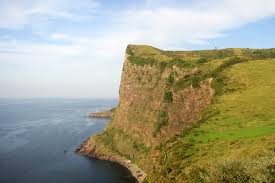记忆方法
1. (在)悬崖(飞呀飞).
2. cliche: 克里车,资本主义腐朽生活.
3. cleave => cliff.
2. cliche: 克里车,资本主义腐朽生活.
3. cleave => cliff.
中文词源
cliff 悬崖
词源同cleave,cleft.
英语词源
- cliff
-
cliff: [OE] Cliff comes from a prehistoric Germanic *kliban, of unknown origin (German klippe ‘crag’ is a collateral relative). The compound cliffhanger seems to have originated in the USA in the 1930s; it comes from the serial movies then popular, in which at the end of each episode the hero or heroine was left in some perilous situation, such as hanging off the edge of a cliff, not resolved until the next instalment.
- cliff (n.)
- Old English clif "rock, promontory, steep slope," from Proto-Germanic *kliban (cognates: Old Saxon clif, Old Norse klif, Middle Dutch klippe, Dutch klip, Old High German klep, German Klippe "cliff, promontory, steep rock").
Clift has been a variant spelling since 15c. and was common in early Modern English, influenced by or merged with clift, a variant of cleft (n.). Cliff-dweller first attested 1889, American English.
权威例句
- 1. A pall of oily black smoke drifted over the cliff-top.
- 一团油腻的黑色烟雾飘到悬崖顶上。
- 2. We hiked the Grand Canyon, exploring Indian cliff dwellings.
- 我们去大峡谷徒步旅行,探究印第安人的崖居。
- 3. A waterfall cascades down the cliff from the hills behind.
- 一处瀑布从身后山崖上飞流直下。
- 4. He scrambled 200 feet up the cliff face.
- 他沿着崖面向上攀登了200英尺。
- 5. They came straggling up the cliff road.
- 他们零零散散地沿着悬崖小路走上来。

